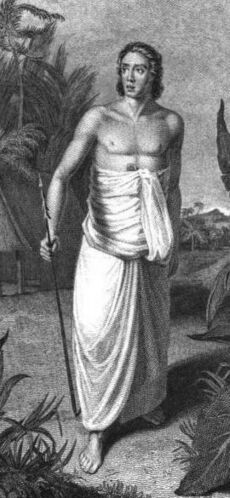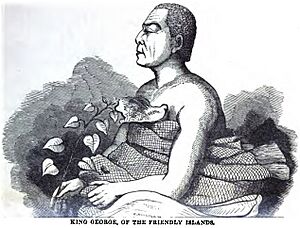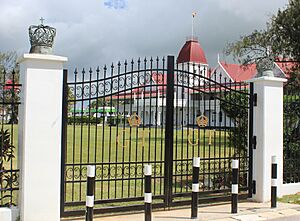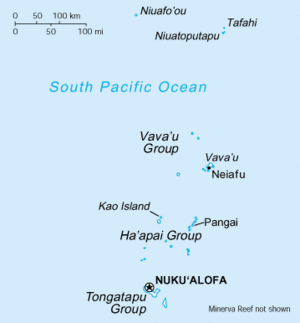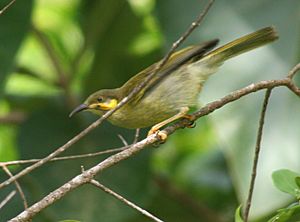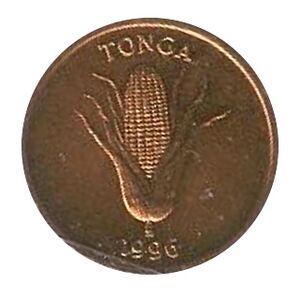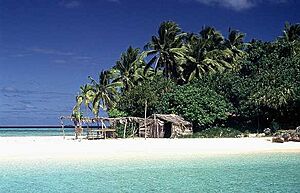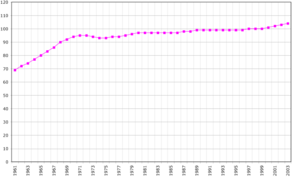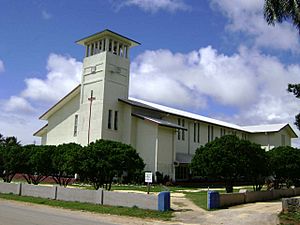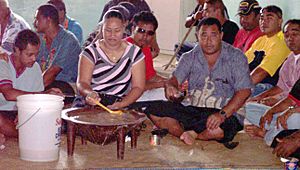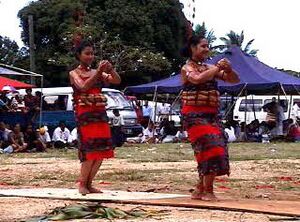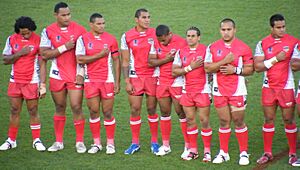Tonga facts for kids
Quick facts for kids
Kingdom of Tonga
Puleʻanga Fakatuʻi ʻo Tonga (Tongan)
|
|
|---|---|
|
Motto: "Ko e ʻOtua mo Tonga ko hoku tofiʻa"
"God and Tonga are my inheritance" |
|
|
Anthem: "Ko e fasi ʻo e tuʻi ʻo e ʻOtu Tonga"
"Song of the King of the Tonga Islands" |
|
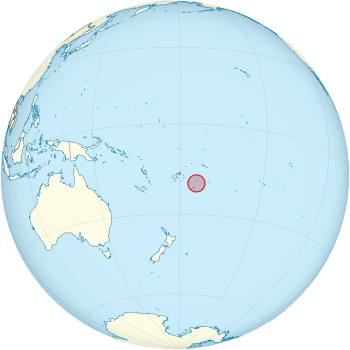 |
|
| Capital and largest city
|
Nukuʻalofa 21°8′S 175°12′W / 21.133°S 175.200°W |
| Official languages |
|
| Ethnic groups
(2021)
|
|
| Religion
(2016)
|
|
| Demonym(s) | Tongan |
| Government | Unitary parliamentary semi-constitutional monarchy |
|
• Monarch
|
Tupou VI |
| Fatafehi Fakafānua | |
|
• Assembly Speaker
|
ʻAlipate Tuʻivanuavou Vaea |
| Legislature | Legislative Assembly |
| Independence
from the United Kingdom
|
|
|
• Independence declared
|
4 June 1970 |
| Area | |
|
• Total
|
748 km2 (289 sq mi) (175th) |
|
• Water (%)
|
4.0 |
| Population | |
|
• 2021 census
|
100,209 (199th) |
|
• Density
|
139/km2 (360.0/sq mi) (76tha) |
| GDP (PPP) | 2019 estimate |
|
• Total
|
$655 million |
|
• Per capita
|
$6,496 |
| GDP (nominal) | 2019 estimate |
|
• Total
|
$493 million |
|
• Per capita
|
$4,888 |
| Gini (2021) | ▼ 27.1 low |
| HDI (2022) | high · 98th |
| Currency | Paʻanga (TOP) |
| Time zone | UTC+13 |
| Date format | dd/mm/yyyy |
| Driving side | left |
| Calling code | +676 |
| ISO 3166 code | TO |
| Internet TLD | .to |
|
|
Tonga (TONG-ə), officially the Kingdom of Tonga, is an island country in Polynesia, part of Oceania. It has 171 islands, and 45 of them have people living on them. The total land area is about 750 square kilometers (289 square miles). These islands are spread over 700,000 square kilometers (270,000 square miles) in the southern Pacific Ocean.
As of 2021, Tonga has a population of 104,494 people. Most of them (70%) live on the main island, Tongatapu. The country stretches about 800 kilometers (500 miles) from north to south. It is surrounded by other island nations like Fiji and Samoa. Tonga is about 1,800 kilometers (1,100 miles) from New Zealand.
Tonga was first settled around 2,500 years ago by the Lapita people. These Polynesian settlers developed their own unique identity, language, and culture. They became very powerful in the South Pacific. This time of Tongan expansion is known as the Tuʻi Tonga Empire. From the rule of the first Tongan king, ʻAhoʻeitu, Tonga grew into a major force. It was a "thalassocracy," meaning it ruled the seas. It controlled large parts of the Pacific, from the Solomon Islands to Fiji and even parts of French Polynesia. The Tuʻi Tonga Empire was known for its strong influence on the economy, people, and culture of the Pacific. This influence remained even after Europeans discovered the islands in 1616.
From 1900 to 1970, Tonga was a "British protected state." This meant the United Kingdom helped Tonga with its foreign affairs through a special agreement. However, Tonga never gave up its independence to any foreign power. In 2010, Tonga made a big change. It moved away from being an absolute monarchy (where the king had all the power) and became a semi-constitutional monarchy. This happened after new laws allowed for its first elections where people could choose their representatives.
Tonga is a member of important international groups. These include the Commonwealth of Nations, the United Nations, and the Pacific Islands Forum.
Contents
What's in a Name?
In many Polynesian languages, including Tongan, the word tonga means 'southwards'. The islands are called this because they are the southernmost group in western Polynesia.
Tonga became known in the West as the "Friendly Islands." This name was given by Captain James Cook when he visited in 1773. He received a warm welcome during a yearly festival. However, some leaders actually planned to kill Cook during this gathering. They didn't do it because they couldn't agree on how to carry out the plan.
Tonga's Story
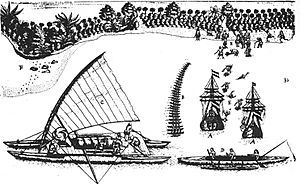
According to Tongan mythology, the demigod Maui pulled a group of islands from the ocean. First came Tongatapu, then the Ha'apai Islands and Vava'u. These islands became modern-day Tonga.
People linked to the Lapita culture settled in Tonga between 1500 and 1000 BC. They came from Island Melanesia and Samoa. Experts believe settlers arrived in the town of Nukuleka by 888 BC. Tonga's early history was passed down through stories told from one generation to the next.
By the 12th century, Tongans and their king, the Tuʻi Tonga, were well-known across the central Pacific. Some historians even call this period the Tuʻi Tonga Empire. There were civil wars in Tonga during the 15th and 17th centuries.
Europeans first met Tongans in 1616. A Dutch ship, the Eendracht, visited the islands to trade. Later, other Dutch explorers like Abel Tasman arrived in 1643. Famous European visitors included Captain James Cook in the 1770s. The first Christian missionaries came in 1797.
In 1845, a skilled Tongan warrior named Tāufaʻāhau united Tonga into one kingdom. He was baptized by missionaries and took the name George. In 1875, he declared Tonga a constitutional monarchy. This meant the king's power was limited by laws. He also gave people more rights, like freedom of the press.
Tonga became a protected state under Britain in 1900. This happened after some European settlers and Tongan chiefs tried to remove the king. Under Britain's protection, Tonga kept its independence. It was the only Pacific nation to keep its own monarchy. The Tongan monarchy has been passed down through the same family for a long time.
The 1918 flu pandemic reached Tonga on a ship from New Zealand. It caused the deaths of 1,800 Tongans. This was about 8% of the population.
Tonga's protection status with Britain ended in 1970. Tonga then joined the Commonwealth of Nations. In 1999, Tonga became a member of the United Nations. Tonga has always governed itself, which makes it special in the Pacific.
In January 2022, the Hunga Tonga–Hunga Haʻapai volcano erupted. It is about 65 kilometers (40 miles) north of Tongatapu. The eruption caused a tsunami that flooded parts of Tonga, including the capital, Nukuʻalofa. It heavily affected the kingdom, cutting off most communication. Four people in Tonga died. It took about five weeks to fix the underwater internet cable.
How Tonga is Governed
Tonga is a constitutional monarchy. This means it has a king or queen, but their power is limited by a constitution. It is the only native monarchy still existing in the Pacific islands. People in Tonga deeply respect their monarch. Tonga provides free and required education for all its citizens. Higher education is also available with low fees or scholarships.
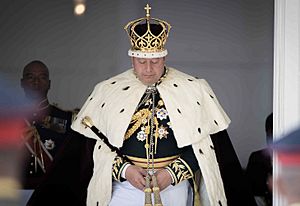
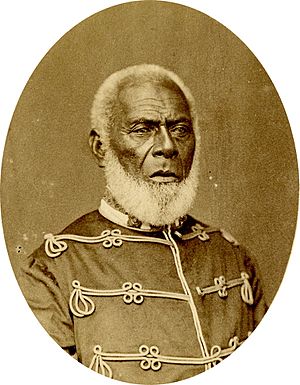
There is a movement in Tonga that wants more democracy. They want common people to have more say in Parliament. They also want the government to be more responsible. This movement does not want to get rid of the monarchy. The idea of having a king or queen is still very popular.
Under King Tāufaʻāhau Tupou IV (who ruled from 1965 to 2006), Tonga's economy grew. The country also improved its healthcare and education systems. More common people gained access to things like houses, cars, and travel abroad.
How Tonga is Divided
Tonga is split into five main areas. These are ʻEua, Haʻapai, Niuas, Tongatapu, and Vavaʻu.
Where is Tonga?
Tonga is an archipelago (a group of islands) in the South Pacific Ocean. It is south of Samoa and about two-thirds of the way from Hawai'i to New Zealand. It has 171 islands, with 45 of them inhabited. These islands stretch about 800 kilometers (500 miles) from north to south. They are divided into three main groups: Vava'u, Ha'apai, and Tongatapu.
The largest island is Tongatapu. The capital city, Nukuʻalofa, is located there. Tongatapu covers 257 square kilometers (99 square miles). Geologically, Tongan islands are either made of limestone from old coral or have a limestone top layer over a volcanic base.
Tonga's Weather
Tonga has a tropical rainforest climate. This means it's warm all year. There's a warm period from December to April, when temperatures can go above 32°C (90°F). There's also a cooler period from May to November, when temperatures rarely go above 27°C (81°F). The northern islands are generally warmer and wetter than the southern ones.
The wettest time is usually around March. The average daily humidity is 80%. The highest temperature ever recorded was 35°C (95°F) in Vava'u in 1979. The coldest was 8.7°C (47.7°F) in Fua'amotu in 1994. Cooler temperatures are more common in the south during the dry season. The tropical cyclone season runs from November 1 to April 30. Tonga is ranked as one of the countries with the highest risk of natural disasters. This is mainly because it faces many natural hazards.
Animals and Nature
Tonga is home to the Tongan tropical moist forests.
In Tonga, flying fox bats are considered sacred. They belong to the monarchy. Because of this, they are protected and cannot be harmed or hunted. As a result, these bats have grown in number on many Tongan islands.
Tonga has 73 types of birds. Two of these birds, the Tongan whistler and the Tongan megapode, are found only in Tonga. Five species have been brought in by humans. Eight species are rare or found by accident. Seven species are globally threatened.
How Tonga Makes Money

Tonga's economy relies a lot on money sent home by Tongans living abroad. About half of the country's population lives overseas, mostly in Australia, New Zealand, and the United States. The royal family and nobles mostly own the businesses that make money, especially in telecommunications.
Tonga wants to grow its private sector. It also aims to improve farming, boost tourism, and make communication and transport better. Good progress has been made, but there's still work to do. A small construction industry is growing, helped by money from abroad. In 2007, Tonga allowed its citizens to have dual citizenship.
The tourist industry is still developing. The government knows that tourism can greatly help the economy. Efforts are being made to increase visitors. Cruise ships often stop in Vavaʻu. This area is known for whale watching, fishing, surfing, and beautiful beaches. It is becoming a key spot in the South Pacific tourism market.
Tonga's postage stamps are popular with collectors. They often have colorful and unusual designs, like heart-shaped or banana-shaped stamps.
In 2007, Tonga became a full member of the World Trade Organization.
Tonga has about 106,000 people. More than twice that number live overseas. Money sent home from these Tongans is a big part of Tonga's income. However, these payments have been decreasing since the 2008 global economic crisis. The tourism industry is getting better, but it's still small, with fewer than 90,000 tourists each year.
Farming and Food
In Tonga, farming and forestry, along with fishing, provide most jobs, foreign money, and food. People in rural Tonga farm for both selling crops and for their own food. Crops grown include bananas, coconuts, coffee, vanilla, and root crops like cassava and sweet potato. As of 2001, two-thirds of farm land was used for root crops.
Processing coconuts into dried coconut used to be the main industry and export. But falling prices and lack of new planting stopped this industry.
Pigs and chickens are the main farm animals. Horses are used for farm work. More cattle are being raised, so less beef needs to be imported.
The traditional land ownership system meant farmers didn't want to plant long-term crops on land they didn't own. Later, kava and vanilla from larger farms became the main farm exports. Squash exports to Japan also helped Tonga's economy.
Powering Tonga
Tonga mostly gets its energy from imported diesel fuel. The country aimed to get 50% of its energy from renewable sources by 2020. In 2019, Tonga announced a new 6-megawatt solar farm on Tongatapu. This plant will be the second-largest solar plant in the Pacific.
Because fossil fuels are becoming less reliable and more expensive, Tonga is looking into renewable energy. With help from IRENA, Tonga has a plan to power its islands using renewable energy. This plan focuses on solar home systems. These systems turn individual homes into small power plants.
Tonga is working to reduce its use of imported diesel by 50%. This will be done using renewable technologies like wind and solar power. As of 2018, Tonga was getting 10% of its electricity from renewable sources.
Who Lives in Tonga?
Over 70% of Tonga's people live on its main island, Tongatapu. More Tongans are moving to the capital, Nukuʻalofa. Here, European and local ways of life mix. However, village life and family ties are still very important across the country. Tonga's population grew from about 32,000 in the 1930s to over 90,000 by 1976.
People of Tonga
Most people in Tonga (over 98%) are Polynesian. About 1.5% are mixed Tongan, and the rest are European (mostly British), mixed European, and other Pacific Islanders. In 2001, about 3,000 to 4,000 Chinese people lived there. After some unrest in 2006, several hundred Chinese people left. Now, only about 300 remain.
Speaking in Tonga
Tongan is an official language, along with English. Tongan is a Polynesian language. It is similar to Wallisian, Niuean, and Hawai'ian.
Faith in Tonga
Tonga does not have an official state religion. The Constitution of Tonga allows for freedom of religion.
In 1928, Queen Salote Tupou III made the Free Wesleyan Church the state religion of Tonga. The main pastor of this church leads the coronation of a Tongan king or queen. He anoints and crowns the monarch. The Church of Tonga separated from the Free Wesleyan Church in 1928.
Islam in Tonga is a small religion in the country. Most Muslims in Tonga follow the Sunni branch of Islam. The Al-Khadeejah Mosque is a well-known mosque in Tonga.
Daily life in Tonga is strongly shaped by Polynesian traditions and the Christian faith. For example, all shops and entertainment stop on Sunday. The constitution says Sunday is sacred forever. Government figures from 2011 show that 90% of the population belongs to a Christian church. The four main churches are:
- Free Wesleyan Church of Tonga (36%)
- The Church of Jesus Christ of Latter-day Saints (18%)
- Roman Catholics (15%)
- Free Church of Tonga (12%)
Staying Healthy
Tonga has one of the highest rates of obesity in the world. Data from 2014 showed Tonga was fourth in the world for average body mass index (BMI). In 2011, 90% of adults were considered overweight, and over 60% were obese. 70% of Tongan women aged 15–85 are obese. Tonga and Nauru have the highest rates of overweight and obese people globally.
In late October 2021, Tonga reported its first case of COVID-19. This was from a New Zealand air passenger who tested positive.
Learning in Tonga
Primary school for ages 6 to 14 is required and free in state schools. Mission schools provide about 8% of primary education and 90% of secondary education. State schools provide the rest. Higher education includes training for teachers and nurses. There is also a small private university and business college for women. Most Tongans go overseas for higher education.
Tongans have a high level of education, with a 98.9% literacy rate. Many pursue advanced degrees overseas. The Kukū Kaunaka Collection keeps all doctoral and master's papers written by Tongans. It is stored at the Institute for Education in Tonga.
Tongans Around the World
Many Tongans have strong connections to other countries. A lot of Tongans have moved to Australia, New Zealand, or the United States. They go there to find jobs and a better life.
In 2018, 82,389 Tongans lived in New Zealand. As of 2000, 36,840 Tongans lived in the US. More than 8,000 Tongans live in Australia. Tongans living abroad keep close ties with their families back home. A large part of Tonga's income comes from money sent to family members who stay in Tonga.
Tongan Traditions
People have lived in Tonga for almost 3,000 years. Before European explorers arrived, Tongans often interacted with their neighbors, Fiji and Niue. In the 19th century, with traders and missionaries, Tongan culture changed. Religion became very important. As of 2013, almost 98% of people in Tonga are Christian. People gave up some old beliefs and adopted new ones.
Understanding Fahu: Family Ties
Fahu is a special way of organizing families in Tonga. It is based on the relationship between a person and their father's sister (aunt) and paternal cousins. In the fahu system, there are a few key ideas about who is more important:
- One's father's side of the family is more important than their mother's side.
- Sisters are seen as more important and sacred than their brothers.
- This means your father's sister is the highest-ranking family member.
In the past, this system guided how important family groups interacted. Even today, fahu rights are still a notable part of Tongan social practices.
Sports in Tonga
Rugby Union
Rugby union is the national sport in Tonga. The national team, called ʻIkale Tahi (Sea Eagles), has done well internationally. Tonga has played in six Rugby World Cups since 1987. Their best performances were in 2007 and 2011. In both tournaments, they won two out of four matches and almost reached the quarterfinals.
In the 2007 Rugby World Cup, Tonga won their first two matches. They beat the USA 25–15 and Samoa 19–15. They almost beat the eventual winners, South Africa, losing 30–25. A loss to England ended their hopes for the knockout stages. However, by finishing third in their group, Tonga automatically qualified for the 2011 Rugby World Cup. In the 2011 World Cup, Tonga beat Japan 31–18 and even defeated the 5th-ranked team, France, 19–14.
Before all their matches, Tonga performs the Ikale Tahi war dance or Sipi Tau. Many players of Tongan descent have played for other national teams, like New Zealand (All Blacks) or Australia (Wallabies).
Rugby League
Rugby league has also become popular. Tonga first played in the Rugby League World Cup in 1995. They have played in every World Cup since then. In the 2008 Rugby League World Cup, Tonga won against Ireland and Scotland. Before the 2017 Rugby League World Cup, several famous players chose to play for Tonga. This led to them beating New Zealand in 2017. The national team has also beaten Great Britain and the world's top team, Australia. Many players of Tongan descent play in Australia's National Rugby League.
Olympics
Besides rugby, Tonga has sent athletes to both the Summer and Winter Olympics. Tonga's only Olympic medal came from the 1996 Summer Olympics in Atlanta. Paea Wolfgramm won a silver medal in boxing. One athlete, Pita Taufatofua, competed in the 2018 Winter Olympics in South Korea.
American Football
Several Tongans have played American football in the National Football League (NFL). Some of these players include Tuineau Alipate, Sione Takitaki, and Star Lotulelei.
Contemporary Tongan Art
In recent years, there has been a big increase in contemporary Tongan artists. Most of them are based in New Zealand. Tanya Edwards creates art using ngatu (bark cloths). Artists like Benjamin Work, Telly Tuita, and Sione Monū have shown their work around the world. Sēmisi Fetokai Potauaine built a large Tongan sculpture in Christchurch. In 2023, a gallery in Auckland, New Zealand, held an exhibition called Tukufakaholo, Tongan Contemporary, featuring eight Tongan artists.
Images for kids
-
Coronation of His Majesty King George Tupou V, 2 August 2008.
See also
 In Spanish: Tonga para niños
In Spanish: Tonga para niños
 | Bayard Rustin |
 | Jeannette Carter |
 | Jeremiah A. Brown |




